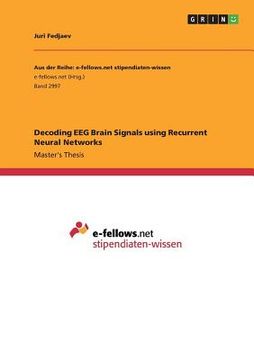Share
Decoding EEG Brain Signals using Recurrent Neural Networks
Juri Fedjaev
(Author)
·
Grin Verlag
· Paperback
Decoding EEG Brain Signals using Recurrent Neural Networks - Fedjaev, Juri
Choose the list to add your product or create one New List
✓ Product added successfully to the Wishlist.
Go to My Wishlists
Origin: U.S.A.
(Import costs included in the price)
It will be shipped from our warehouse between
Wednesday, July 17 and
Friday, August 02.
You will receive it anywhere in United Kingdom between 1 and 3 business days after shipment.
Synopsis "Decoding EEG Brain Signals using Recurrent Neural Networks"
Master's Thesis from the year 2017 in the subject Electrotechnology, grade: 1,0, Technical University of Munich (Neurowissenschaftliche Systemtheorie), language: English, abstract: Brain-computer interfaces (BCIs) based on electroencephalography (EEG) enable direct communication between humans and computers by analyzing brain activity. Specifically, modern BCIs are capable of translating imagined movements into real-life control signals, e.g., to actuate a robotic arm or prosthesis. This type of BCI is already used in rehabilitation robotics and provides an alternative communication channel for patients suffering from amyotrophic lateral sclerosis or severe spinal cord injury. Current state-of-the-art methods are based on traditional machine learning, which involves the identification of discriminative features. This is a challenging task due to the non-linear, non-stationary and time-varying characteristics of EEG signals, which led to stagnating progress in classification performance. Deep learning alleviates the efforts for manual feature engineering through end-to-end decoding, which potentially presents a promising solution for EEG signal classification. This thesis investigates how deep learning models such as long short-term memory (LSTM) and convolutional neural networks (CNN) perform on the task of decoding motor imagery movements from EEG signals. For this task, both a LSTM and a CNN model are developed using the latest advances in deep learning, such as batch normalization, dropout and cropped training strategies for data augmentation. Evaluation is performed on a novel EEG dataset consisting of 20 healthy subjects. The LSTM model reaches the state-of-the-art performance of support vector ma- chines with a cross-validated accuracy of 66.20%. The CNN model that employs a time-frequency transformation in its first layer outperforms the LSTM model and reaches a mean accuracy of 84.23%. This shows that deep learning approaches deliver competitive performance
- 0% (0)
- 0% (0)
- 0% (0)
- 0% (0)
- 0% (0)
All books in our catalog are Original.
The book is written in English.
The binding of this edition is Paperback.
✓ Producto agregado correctamente al carro, Ir a Pagar.

